Riccardo Nova
Komponist

Which sound is special for you?
The vocal sounds are for me the most fascinating sounds. In particular I found inspiring the sounds of ancient languages. Over the last 20 years I have been studying vedic recitation. The archaic quality of this „lost“ language embedded with sophisticated grammar is full of beauty.
What do you want to find out with your music?
I find pleasure while composing and while playing and in doing so I better understand the meaning of life. Music gives a meaning to life. Make music not War!
How do you handle music’s history?
Music history as taught\learned in academic institutions has a limited definition. History of music as we know it could be better defined as the history of notation, from neumatic notation to the ars antiqua from ars nova till Darmstadt and beyond… As a musician, in my birth context, I started learning an instrument, reading and writing music, using the eyes as a powerful tool in synergy with the ears. There are many other huge chapters which are generally not included, due to the medium of transmission, in our history books: the chapter of the oral tradition, many of these chapters are nowadays lost since the oral traditions generally die. The Indian musical oral tradition survived and there are amazingly interesting chapters. I am convinced that those are part of the universal musical heritage. To answer your question: I handle music history by digging not only in the writen domain and its history but also in the oral domain and its techniques used to preserve the memory without the writing tool. It is fascinating that the oldest mnemonic effort (as far as I know) of humanity is the memorisation process of the vedic rituals associated with complex salmodic chant. There is a long history in the Indian musical oral tradition that goes from those ancestral chants with their memorisation techniques and their complex metrical structures onto the classical Carnatic/hindustani music with its ultra developed rhythmic virtuosity.